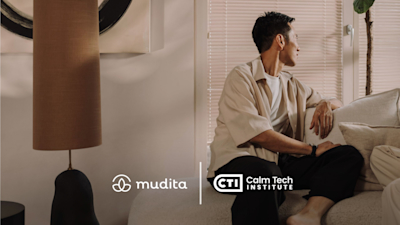
How To Reclaim Your Focus in a World Full of Distractions
Humans are brilliant, curious, but at the same time, let’s be frank, deeply flawed creatures. We’ve built machines that outthink us, tools that outpace us, and platforms that outmaneuver us at every click.
Without a doubt, technology (I’m thinking digital technology here) has been our proudest achievement, but, (not to sugarcoat anything), it has raced so far ahead of our paleolithic instincts that we’ve become a civilization struggling to keep up with our own creations.
Let’s be honest, we’d like to think we’re adept at adapting to rapid technological changes. But we’re not.
And why should we be? Evolution crafted our minds for survival in the wild, not for navigating an endless digital scroll. Combine our natural limitations with technology that’s designed to hijack our attention, and we’ve got a perfect storm.
More Focus with Mudita Kompakt
Edward O. Wilson, the Harvard professor and renowned father of sociobiology, put it best: “We have paleolithic emotions, medieval institutions, and godlike technology.” This trifecta has left us floundering in a sea of distractions, struggling to maintain even a shred of focus.
Factor in a global pandemic that shoved every aspect of our lives online (work, school, socializing, entertainment) and it’s no surprise we’re more scatterbrained than ever.
However, in the digital age, where our attention is currency, reclaiming focus isn’t just desirable, it’s essential.
If you’re reading this and thinking, “Yes, I struggle with focus too,” you’re not alone.
Did you know that the average worker gets only 2 hours and 53 minutes of focused work per day? A study by Vouchercloud found that full-time office workers spend the rest of their time grappling with distractions, whether from digital devices, socializing with colleagues, or noisy environments. It’s no wonder so many of us feel like we can’t accomplish what we want or find satisfaction in our work. [1]
So, how do we do it?
Let’s dig in.
Why Are We So Distracted?
The Evolution of Media Consumption Once upon a time, we were a society of readers. Books demanded time, patience, and deep engagement. However, as media evolved, from books to television to the internet and, now, social media, our habits shifted. Each new medium demanded less focus and offered more fragmented, bite-sized information. Today, we’re bombarded by rapid-fire content: 30-second videos, flashy headlines, and endless notifications. The result? Our brains have been rewired to crave speed over depth, stimulation over reflection.
Hostile Design Environments Platforms like TikTok, YouTube, and Instagram are masters of manipulation. They’re engineered to steal your attention with dopamine-driven feedback loops, like a slot machine in your pocket. Their goal isn’t to inform or enrich you, it’s to keep you glued to their screens for as long as possible.
Neuroplasticity Gone Rogue Here’s the thing: our brains are incredibly adaptable. They’re constantly rewiring based on the tools we use and the habits we form. The downside? Spending hours scrolling through fragmented content trains our brains to expect constant stimulation, making it nearly impossible to focus on a single task.
Cultural Shifts in Attention Let’s not forget the cultural aspect. Today’s media prioritizes entertainment and aesthetics over depth and meaning. Politics is reduced to soundbites, art is created to accommodate multitasking, and even conversations are interrupted by the siren call of a vibrating phone. Have you heard of contaminated time? If not, check out our blog on the topic & see if you can relate. We’re all guilty of it, but it’s important to be aware of how our attention is being hijacked by technology.
Corporate Incentives We all know BIG TECH doesn’t just profit from our distractions. Our attention is their bread and butter, they thrive on them. Every second you spend scrolling, clicking, or watching adds to their bottom line. Ethical design? It’s a rare exception in an industry that’s optimized for addiction. Remember, if you’re not paying for the service, YOU ARE the service.
The Path Back to Focus
Limit Digital Distractions Start by creating boundaries with your devices. Turn off non-essential notifications. Set app limits. Better yet, take intentional breaks from your phone altogether. And if that feels impossible, consider a digital detox. Go an entire day without your phone. You might be surprised at how liberating it feels.
Consume Media That Demands Attention Remember books? They’re still around, and they’re still excellent at training your brain to focus. Pick one up. Or, if books aren’t your thing, try films that require your undivided attention. Pro tip: skip the Netflix algorithm fodder designed for distracted viewing. Better yet, leave the house & go to the movies. Most likely, you’ll be asked to turn off your phone and you’ll be forced to sit through the previews without any distractions. It’s a great way to train your brain to focus on one thing at a time.
Develop Mindful Habits Go for a walk without your phone. Let your mind wander. Practice being present with your thoughts. It’s not easy, but the benefits are enormous. Mindfulness trains your brain to resist the constant pull of digital distractions. You can read all about the science of mindfulness & and meditation in an article on our blog.
Rewire Through Consistency Building focus is like building muscle: it takes time and effort. Create daily habits that prioritize deep work and reflection. Start small: 10 minutes of uninterrupted reading or journaling can work wonders. BONUS: Mindful journaling before bed can actually help you get a better night’s rest. When you put the day to “bed” through writing, it serves as a mindful way to evaluate the day, accept what's happened and let it go.
Evaluate Your Media Diet Not all media is created equal. Be intentional about what you consume. Does it add value to your life? Does it challenge you to think deeply? If not, let it go. In the end, it’s all about balance. Even social media can serve as a tool. We wrote a mindful social media guide, if you want to check that out.
Enter Mudita Kompakt
When the world is designed to distract you, Mudita Kompakt is here to help you reclaim your focus. Our minimalist phone isn’t just another device on the market. At Mudita, we think it's a solution and a tool that helps you live a more intentional life. It’s a way to disconnect from the noise and connect with what matters most.
By stripping away unnecessary features like social media and endless notifications, it creates space for what truly matters.
With Mudita Kompakt, you can stay connected without succumbing to the chaos of digital distractions. Its thoughtful design aligns with Mudita’s philosophy of simplicity and mindfulness, empowering you to cultivate healthier relationships with technology.
If you’re ready to reclaim your attention and focus on what matters most, Mudita Kompakt is your ally in this journey.
If you’re interested in Mudita Kompakt, it’s available for purchase through Indiegogo
Get Mudita Kompakt on Indiegogo
Final Thoughts
Reclaiming focus in today’s distraction-driven world isn’t easy, but it is possible. By limiting digital distractions, embracing mindful habits, and choosing tools like Mudita Kompakt, you can take back control of your attention.
The question is: Are you ready to fight for your focus?
Related stories

New Mudita Kompakt update 1.4.0 released
Discover what’s new in MuditaOS K 1.4.0, including group messaging, music player upgrades, eReader updates, default app selection & systemwide improvements.

Mudita Products Achieve Calm Tech Institute Certification
Mudita Kompakt, Harmony 2 & Bell 2 earn Platinum Tier Calm Tech Certification for promoting calm, focus, and better sleep.

Are Smartphones Breaking Social Norms?
Smartphones are reshaping social norms, disrupting etiquette and face-to-face connection. Learn how mindful tech use can restore balance.
If you'd like to receive the best stories from our blog, keep up to date with our progress and get notified about our product releases and special discounts.